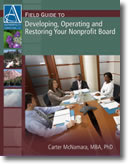© Copyright Carter
McNamara, MBA, PhD, Authenticity Consulting, LLC.
Overview of a Board Finance Committee
The Board Finance Committee is a usually standing committee chartered to guide,
oversee and support the financial and tax practices of the organization, including
approval and conformance regarding up-to-date fiscal policies and procedures;
development of the annual budget; and ensuring accurate tracking and analysis
of financial highlights, trends, and issues. It also ensures conformance with relevant
financial and tax rules and regulations, as well as standards of accounting.
Typically annual recurring goals of this committee might be to:
- Ensure conformance to relevant rules and regulations affecting financial
management and taxes, e.g., IRS and Sarbanes Oxley. - Ensure accuracy and efficiency of financial management by reviewing and
updating the fiscal policies and procedures, and training all Board members
and relevant leaders about the policies and procedures. - Train other Board members and leaders in the organization on how to analyze
financial data and make appropriate decisions. - Ensure organizational sustainability by developing appropriate budgets
(operating, product/program-based, etc.) that are approved by the Board. - Ensure ongoing effectiveness and efficiency in the management of financial
resources with timely generation and analysis of relevant financial information. - Ensure effectiveness and focus on revenue development by establishing revenue
targets for each product/program where appropriate. - Ensure sufficient protection of assets, including through risk assessment
and responding strategies, e.g., insurance protection and sound cash management.
The Committee should have a work plan that itemizes these, or very similar,
annual goals and also associated objectives with each goal such that when the
objectives are achieved in total, they also will have achieved their respective
goal. When committees do not have work plans, they often flounder in finding
valuable and focused means to provide value to the Board. Unfortunately, in
these situations, many Board mistakenly conclude that “committees do not
work”, or they reduce the number of committees, thinking that inactive
committees were because there were too many — rather than realizing that committees
can be extremely useful when focused on the most important annual recurring
goals.
Additional Perspectives on Finance Committees
The Finance Committee and Committee Chair Responsibilities | Nonprofit Accounting Basics
Creating a Financial and Audit Committee
Nonprofit Finance Committee Explanation
The Role Of Your Finance Committee
Nonprofit Finance vs Audit Committees | Minnesota Council of Nonprofits
Board Finance Committee
Also, consider
Related Library Topics
Learn More in the Library’s Blogs Related to This Topic
In addition to the articles on this current page, also see
the following blogs have posts related to this topic. Scan
down the blog’s page to see various posts. Also, see the section
“Recent Blog Posts” in the sidebar of the blog or click
on “next” near the bottom of a post in the blog. The
the blog also links to numerous free related resources.
Library’s
Boards of Directors Blog
Library’s
Nonprofit Capacity Building Blog
›Return to All About Boards of Directors
For the Category of Boards of Directors:
To round out your knowledge of this Library topic, you may
want to review some related topics, available from the link below.
Each of the related topics includes free, online resources.
Also, scan the Recommended Books listed below. They have been
selected for their relevance and highly practical nature.
 Sections of this topic
Sections of this topic

















